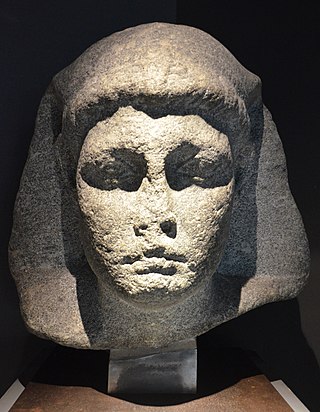Related Research Articles

Gaius Julius Caesar Augustus, also known as Octavian, was the founder of the Roman Empire. He reigned as the first Roman emperor from 27 BC until his death in AD 14. The reign of Augustus initiated an imperial cult, as well as an era of imperial peace in which the Roman world was largely free of armed conflict. The Principate system of government was established during his reign and lasted until the Crisis of the Third Century.

The Battle of Actium was a naval battle fought between Octavian's maritime fleet, led by Marcus Agrippa, and the combined fleets of both Mark Antony and Cleopatra. The battle took place on 2 September 31 BC in the Ionian Sea, near the former Roman colony of Actium, Greece, and was the climax of over a decade of rivalry between Octavian and Antony.

Marcus Antonius, commonly known in English as Mark Antony, was a Roman politician and general who played a critical role in the transformation of the Roman Republic from a constitutional republic into the autocratic Roman Empire.
This article concerns the period 39 BC – 30 BC.

Year 44 BC was either a common year starting on Sunday, common year starting on Monday, leap year starting on Friday, or leap year starting on Saturday. and a common year starting on Sunday of the Proleptic Julian calendar. At the time, it was known as the Year of the Consulship of Julius Caesar V and Marc Antony. The denomination 44 BC for this year has been used since the early medieval period, when the Anno Domini calendar era became the prevalent method in Europe for naming years.

This article concerns the period 49 BC – 40 BC.

Cleopatra VII Thea Philopator was Queen of the Ptolemaic Kingdom of Egypt from 51 to 30 BC, and its last active ruler. A member of the Ptolemaic dynasty, she was a descendant of its founder Ptolemy I Soter, a Macedonian Greek general and companion of Alexander the Great. Her first language was Koine Greek, and she is the only Ptolemaic ruler known to have learned the Egyptian language. After her death, Egypt became a province of the Roman Empire, marking the end of the last Hellenistic-period state in the Mediterranean, a period which had lasted since the reign of Alexander.

The Second Triumvirate was an extraordinary commission and magistracy created at the end of the Roman republic for Mark Antony, Lepidus, and Octavian to give them practically absolute power. It was formally constituted by law on 27 November 43 BC with a term of five years; it was renewed in 37 BC for another five years before expiring in 32 BC. Constituted by the lex Titia, the triumvirs were given broad powers to make or repeal legislation, issue judicial punishments without due process or right of appeal, and appoint all other magistrates. The triumvirs also split the Roman world into three sets of provinces.

Ptolemy XV Caesar, nicknamed Caesarion, was the last pharaoh of Ptolemaic Egypt, reigning with his mother Cleopatra VII from 2 September 44 BC until her death by 12 August 30 BC, then as sole ruler until his death was ordered by Octavian.
Ptolemy Philadelphus was a Ptolemaic prince and was the youngest and fourth child of Greek Ptolemaic Queen Cleopatra VII of Egypt, and her third with Roman Triumvir Mark Antony.

Fulvia was an aristocratic Roman woman who lived during the late Roman Republic. Fulvia's birth into an important political dynasty facilitated her relationships and, later on, marriages to Publius Clodius Pulcher, Gaius Scribonius Curio, and Mark Antony. All of these men would go on to lead increasingly promising political careers as populares, tribunes, and supporters of Julius Caesar.

A philippic is a fiery, damning speech, or tirade, delivered to condemn a particular political actor. The term is most famously associated with three noted orators of the ancient world: Demosthenes of ancient Athens, Cato the Elder and Cicero of ancient Rome. The term itself is derived from Demosthenes's speeches in 351 BC denouncing the imperialist ambitions of Philip of Macedon, which later came to be known as The Philippics.

The War of Actium was the last civil war of the Roman Republic, fought between Mark Antony and Octavian. In 32 BC, Octavian convinced the Roman Senate to declare war on the Egyptian queen Cleopatra. Her lover and ally Mark Antony, who was Octavian's rival, gave his support for her cause. Forty percent of the Roman Senate, together with both consuls, left Rome to join the war on Antony's side. After a decisive victory for Octavian at the Battle of Actium, Cleopatra and Antony withdrew to Alexandria, where Octavian besieged the city until both Antony and Cleopatra were forced to commit suicide.
The Battle of Alexandria was fought on July 1 to July 30, 30 BC between the forces of Octavian and Mark Antony during the last war of the Roman Republic. In the Battle of Actium, Antony had lost the majority of his fleet and had been forced to abandon the majority of his army in Greece, where without supplies they eventually surrendered. Although Antony's side was hindered by a few desertions, he still managed to narrowly defeat Octavian's forces in his initial defence. The desertions continued, however, and, in early August, Octavian launched a second, ultimately successful, invasion of Egypt, after which Antony and his lover, Cleopatra, committed suicide.

Julius Caesar was assassinated by a group of senators on the Ides of March of 44 BC during a meeting of the Senate at the Curia of Pompey of the Theatre of Pompey in Rome where the senators stabbed Caesar 23 times. They claimed to be acting over fears that Caesar's unprecedented concentration of power during his dictatorship was undermining the Roman Republic. At least 60 to 70 senators were party to the conspiracy, led by Marcus Junius Brutus, Gaius Cassius Longinus, and Decimus Junius Brutus Albinus. Despite the death of Caesar, the conspirators were unable to restore the institutions of the Republic. The ramifications of the assassination led to his martyrdom, the Liberators' civil war and ultimately to the Principate period of the Roman Empire.

The Philippics are a series of 14 speeches composed by Cicero in 44 and 43 BC, condemning Mark Antony. Cicero likened these speeches to those of Demosthenes against Philip II of Macedon; both Demosthenes' and Cicero's speeches became known as Philippics. Cicero's Second Philippic is styled after Demosthenes' On the Crown.

Cleopatra VII, the last ruler of Ptolemaic Egypt, died on either 10 or 12 August, 30 BC, in Alexandria, when she was 39 years old. According to popular belief, Cleopatra killed herself by allowing an asp to bite her, but according to the Roman-era writers Strabo, Plutarch, and Cassius Dio, Cleopatra poisoned herself using either a toxic ointment or by introducing the poison with a sharp implement such as a hairpin. Modern scholars debate the validity of ancient reports involving snakebites as the cause of death and whether she was murdered. Some academics hypothesize that her Roman political rival Octavian forced her to kill herself in a manner of her choosing. The location of Cleopatra's tomb is unknown. It was recorded that Octavian allowed for her and her husband, the Roman politician and general Mark Antony, who stabbed himself with a sword, to be buried together properly.
Glaphyra was a hetaera, a form of courtesan, who lived in the 1st century BC. Glaphyra was famed and celebrated in antiquity for her beauty, charm and seductiveness. Her marriage to Archelaus the elder of Cappadocia gave her political power. Her later affair with Mark Antony occasioned a vulgar poem from Octavian Caesar.
Gaius Cassius Parmensis was a Roman politician and a Latin writer of the late Roman Republic, who belonged to the circle of conspirators against Gaius Julius Caesar.

The reign of Cleopatra VII of the Ptolemaic Kingdom of Egypt began with the death of her father, Ptolemy XII Auletes, by March 51 BC. It ended with her suicide in August 30 BC, which also marked the conclusion of the Hellenistic period and the annexation of Egypt into a Roman province. In the style of her Greek predecessors, Cleopatra reigned over Egypt and other territories as an absolute monarch, although the Roman Republic frequently interfered in its internal affairs. Her personal rule of Egypt was characterized by a continued reliance on agriculture, extensive trade and conflict with other states, the tackling of corruption, strategic management of the bureaucracy, and ambitious building projects.
References
- ↑ "in·vec·tive." The American Heritage Dictionary of the English Language , Fourth Edition. 2000, 2003 Houghton Mifflin Company.
- ↑ "invective." Collins Essential English Dictionary, 2004, 2006. HarperCollins Publishers.
- ↑ "invective." WordNet 3.0, Farlex clipart collection.[sic] 2003-2008. Princeton University, Clipart.com, Farlex Inc. 13 May 2017 http://www.thefreedictionary.com/invective. Note: This MLA format citation (which provided the most information regarding this unusual citation) was provided on the web page.
- ↑ Borgies, Loïc (2016). Le conflit propagandiste entre Octavien et Marc Antoine. De l'usage politique de la uituperatio entre 44 et 30 a. C. n. Brussels: Latomus. ISBN 978-90-429-3459-7.